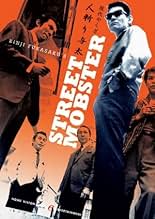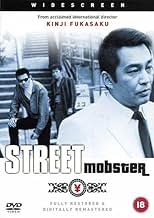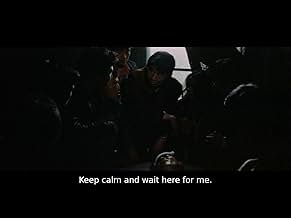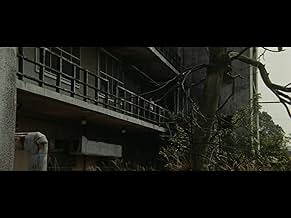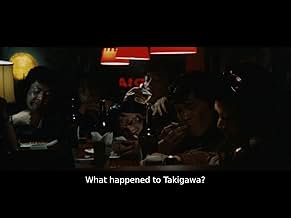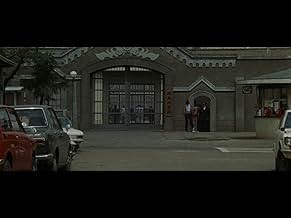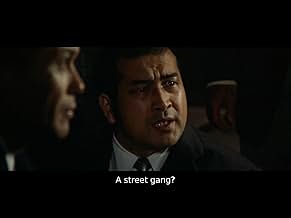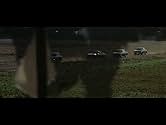VALUTAZIONE IMDb
7,1/10
1333
LA TUA VALUTAZIONE
Aggiungi una trama nella tua linguaA yakuza, who has an untamed rage and lack of respect for authority, finds himself leading the remnants of the gang he once belonged to in order to secure an area of their own.A yakuza, who has an untamed rage and lack of respect for authority, finds himself leading the remnants of the gang he once belonged to in order to secure an area of their own.A yakuza, who has an untamed rage and lack of respect for authority, finds himself leading the remnants of the gang he once belonged to in order to secure an area of their own.
- Regia
- Sceneggiatura
- Star
Recensioni in evidenza
Bunta Sugawara plays a low-level criminal who keeps getting in trouble with a major yakuza clan. After a ton of screwing around with them, a second yakuza clan adopts him as one of their own. At first, everyone's happy about it, but soon enough, Sugawara feels trapped and starts to act out. This, of course, does not please his bosses. The main problem with this one is that Sugawara's character is just so unlikable - you have to wonder why the yakuza on either side keep letting him screw around so much. The mobsters from The Godfather would have whacked him instantly (especially since he's essentially a nobody; he has a few followers, but they're just punks, too). The value of the film comes from Fukasaku's direction, which seems revolutionary for 1972, almost Jason Bourne-like with hand-held cameras, thrusting the audience in the kinetic action sequences. The direction is definitely some of Fukasaku's best work.
Street Mobster is among my favorite yakuza films, and from one of my favorite Japanese directors. This is a great, less-popular Fukasaku film, and it really deserves more attention.
Okita is our "hero", if you can call him that. He's hot-heated, violent, and unapologetic. I can't think of a time in the film where he really shows restraint. He's just such an over-the-top, punk rockin' character who doesn't care about rival gangs or other thugs; he wants to do what he wants, when he wants to. And that's definitely the driving force behind the film, it's explosive nature. It's so unglamorous and filthy at times, and yet you have this sense of a man living his life, maybe not to it's full potential, but having a hell of a lot of fun doing what he's doing. And maybe he's not even enjoying it, everything else is just too conformist for him. He simply doesn't back down. So he really is a hero, a hero to the downtrodden. A counterculture icon, a raging machine.
With it's boisterous protagonist comes a slew of background characters who are really just there to make Okita the centerpiece. Aside from the prostitute that he raped years earlier and now forms a bond with (Whose name I can't even remember!) there are few other noteworthy characters. And that's really okay. When they speak, they speak to get Okita's reaction. If you don't like Okita, then you're probably not going to like the film. Me, I enjoyed this rebellious, non-conformist gangster, yelling and picking fights. It was just so over-the-top and the director clearly embraced the punk style that was emerging at the time of this film's release.
Speaking of release time, I just watched the film again a few minutes ago, and I still can't believe it was made in 1972. I'm sure you've heard it before, but it's way ahead of it's time. It looks 90s-ish to me. The shaky-cam and jump cuts stand out most as then-foreign techniques. Of course, now they've become the norm in films.
So that's my short review. I don't feel that there's a whole lot more ground to cover as Okita is really the main attraction. So if you're looking to kill 87 minutes and consider yourself a fan of exciting cinema, look no further than Street Mobster.
Okita is our "hero", if you can call him that. He's hot-heated, violent, and unapologetic. I can't think of a time in the film where he really shows restraint. He's just such an over-the-top, punk rockin' character who doesn't care about rival gangs or other thugs; he wants to do what he wants, when he wants to. And that's definitely the driving force behind the film, it's explosive nature. It's so unglamorous and filthy at times, and yet you have this sense of a man living his life, maybe not to it's full potential, but having a hell of a lot of fun doing what he's doing. And maybe he's not even enjoying it, everything else is just too conformist for him. He simply doesn't back down. So he really is a hero, a hero to the downtrodden. A counterculture icon, a raging machine.
With it's boisterous protagonist comes a slew of background characters who are really just there to make Okita the centerpiece. Aside from the prostitute that he raped years earlier and now forms a bond with (Whose name I can't even remember!) there are few other noteworthy characters. And that's really okay. When they speak, they speak to get Okita's reaction. If you don't like Okita, then you're probably not going to like the film. Me, I enjoyed this rebellious, non-conformist gangster, yelling and picking fights. It was just so over-the-top and the director clearly embraced the punk style that was emerging at the time of this film's release.
Speaking of release time, I just watched the film again a few minutes ago, and I still can't believe it was made in 1972. I'm sure you've heard it before, but it's way ahead of it's time. It looks 90s-ish to me. The shaky-cam and jump cuts stand out most as then-foreign techniques. Of course, now they've become the norm in films.
So that's my short review. I don't feel that there's a whole lot more ground to cover as Okita is really the main attraction. So if you're looking to kill 87 minutes and consider yourself a fan of exciting cinema, look no further than Street Mobster.
"Street Mobster" is part of the early 70's crop of Japanese yakuza films that were spearheaded by Kinji Fukasaku, who is once again behind the helm without missing a beat. All the mandatory elements that make a yakuza film work are present: forming and switching of alliances between yakuza families, fistfights, stabbings, a guerilla view of Tokyo, frenetic action sequences, sleaze. But whereas a lesser, more workmanlike director would work these things from a checklist, Fukasaku instills so much energy that even the most rudimentary of things are a pleasure to watch.
Indeed "Street Mobster" is packed full of raw, animalistic energy that more than makes up for the fairly predictable nature of the story. In typical yakuza fashion, yakuza gets out of prison after doing time for a hit, forms a small gang, takes on the bigger families, carnage ensues. It's all part of what makes the genre such pure, unadulterated fun though. However all these typical genre staples take a wildly exhilarating life of their own through Fukasaku's hyperkinetic and gritty style. There's no glamour or glory to be found in Fukasaku's violence: only brutality. Stylization is kept to a bare minimum with lots of hand-held shots and cameras constantly on the move that blend in with the action. The same guerilla tactics are used for the exterior shots that capture the seedy, downtrodden side of a Tokyo full of possibilities. Dilapidated warehouses, cheap bath houses, dark rooms, dim-lit diners, rundown neighborhoods with wooden cabins, again there's no glitz or neon lights shining in Fukasaku's yakuza universe.
Regular collaborator Bunta Sugawara takes on the role of the titular Street Mobster, but gone is his cool (and sullen) demeanor from other yakuza films. He's responsible for some serious scenery consumption, wildly overacting, often approaching even Kikuchiyo territory (Mifune's character from Seven Samurai) but with the same honest, natural approach that made him the great actor that he was. He's also one of the best physical actors I've seen and you can see it paying off in dividends with every fight scene he gets involved with (and there are lots, don't worry).
If you'd like to see a different kind of gangster film, one that relies more on viscera, grittiness and raw energy than faux glamour and hip mafiosos, you should definitely invest in Street Mobster. It's pulpy, fast-paced and balls-out. 70's Japanese action cinema in top form
Indeed "Street Mobster" is packed full of raw, animalistic energy that more than makes up for the fairly predictable nature of the story. In typical yakuza fashion, yakuza gets out of prison after doing time for a hit, forms a small gang, takes on the bigger families, carnage ensues. It's all part of what makes the genre such pure, unadulterated fun though. However all these typical genre staples take a wildly exhilarating life of their own through Fukasaku's hyperkinetic and gritty style. There's no glamour or glory to be found in Fukasaku's violence: only brutality. Stylization is kept to a bare minimum with lots of hand-held shots and cameras constantly on the move that blend in with the action. The same guerilla tactics are used for the exterior shots that capture the seedy, downtrodden side of a Tokyo full of possibilities. Dilapidated warehouses, cheap bath houses, dark rooms, dim-lit diners, rundown neighborhoods with wooden cabins, again there's no glitz or neon lights shining in Fukasaku's yakuza universe.
Regular collaborator Bunta Sugawara takes on the role of the titular Street Mobster, but gone is his cool (and sullen) demeanor from other yakuza films. He's responsible for some serious scenery consumption, wildly overacting, often approaching even Kikuchiyo territory (Mifune's character from Seven Samurai) but with the same honest, natural approach that made him the great actor that he was. He's also one of the best physical actors I've seen and you can see it paying off in dividends with every fight scene he gets involved with (and there are lots, don't worry).
If you'd like to see a different kind of gangster film, one that relies more on viscera, grittiness and raw energy than faux glamour and hip mafiosos, you should definitely invest in Street Mobster. It's pulpy, fast-paced and balls-out. 70's Japanese action cinema in top form
76325
Unbelievable - this ultraviolent gangster flick is from 1972 - if it wasn't for the poor monophonic sound mix on the dvd, you almost wouldn't recognize the age! Fast cuts, ultracool gangster hero, bloody beat-ups and shootings - everything that Beat Takeshi Kitano is exploring and developing to a further stage in his brilliant movies 'Hana-Bi' or 'Brother' can be found in this masterpiece as a blueprint.
Fans of Asian action cinema won't be disappointed - the film is moving so fast, the inevitable climax almost let's you lose breath - this is a true gem! Get it, see it!
Fans of Asian action cinema won't be disappointed - the film is moving so fast, the inevitable climax almost let's you lose breath - this is a true gem! Get it, see it!
Street Mobster is a violent Japanese gangster movie by prolific director Fukasaku Kinji who would later on direct influential genre masterpieces such as Battles Without Honor and Humanity, Graveyard of Honor and Yakuza Graveyard. Western audiences know him as the director of dystopian action thriller Battle Royale which was the last movie he was able to complete.
The story of this movie is rather simple. It follows the life of a violent gangster who attacks the members of an inflluential clan who try to extort money from him and associates. He spends some time in prison but soon forms a new gang that is particularly violent. He ultimately gets injured and is temporarily forced to join a bigger family for protection. When another and even bigger family from Osaka tries to increase its influence in Kawasaki, the film's violent antagonist decides to disrespect common conventions and brutally disrespects the different gangster families. The three involved families come to the only reasonable conclusion: they must cooperate to eliminate the antagonist and his associates to preserve peace.
The most interesting element about Street Mobster is its violent, nihilistic and egoistic antagonist who isn't interested in compromises, peace or truces. He desires to become the biggest gangster boss in the country by any means necessary. While this character is extremely dislikeable, he is brutally consequent and honest in his actions and therefore more complex and profound than one might think at first contact. The movie impresses with numerous violent scenes supported by dynamic camera work that have aged rather well and can still be considered offensive nowadays. The film has frantic pace and entertains from start to finish.
On the negative side, there are very few characters to sympathize or empathize with. As opposed to Western gangster movies, even the victims and outsiders in organized crime come off as careless and despicable. The story is also extremely thin and quite predictable. The action scenes are quite intense but also rather repetitive. The movie impresses at first contact but lacks creativity, depth and diversity.
To conclude, you should watch Street Mobster if you are looking for a particularly brutal, entertaining and fast gangster movie that has stood the test of time. This film certainly entertains while it last but doesn't leave any deeper impression due to its thin story line. Street Mobster is a feast for genre fans but can't compete with Fukasaku Kinji's later works.
The story of this movie is rather simple. It follows the life of a violent gangster who attacks the members of an inflluential clan who try to extort money from him and associates. He spends some time in prison but soon forms a new gang that is particularly violent. He ultimately gets injured and is temporarily forced to join a bigger family for protection. When another and even bigger family from Osaka tries to increase its influence in Kawasaki, the film's violent antagonist decides to disrespect common conventions and brutally disrespects the different gangster families. The three involved families come to the only reasonable conclusion: they must cooperate to eliminate the antagonist and his associates to preserve peace.
The most interesting element about Street Mobster is its violent, nihilistic and egoistic antagonist who isn't interested in compromises, peace or truces. He desires to become the biggest gangster boss in the country by any means necessary. While this character is extremely dislikeable, he is brutally consequent and honest in his actions and therefore more complex and profound than one might think at first contact. The movie impresses with numerous violent scenes supported by dynamic camera work that have aged rather well and can still be considered offensive nowadays. The film has frantic pace and entertains from start to finish.
On the negative side, there are very few characters to sympathize or empathize with. As opposed to Western gangster movies, even the victims and outsiders in organized crime come off as careless and despicable. The story is also extremely thin and quite predictable. The action scenes are quite intense but also rather repetitive. The movie impresses at first contact but lacks creativity, depth and diversity.
To conclude, you should watch Street Mobster if you are looking for a particularly brutal, entertaining and fast gangster movie that has stood the test of time. This film certainly entertains while it last but doesn't leave any deeper impression due to its thin story line. Street Mobster is a feast for genre fans but can't compete with Fukasaku Kinji's later works.
Lo sapevi?
- ConnessioniFeatured in Yakuza Eiga, une histoire du cinéma yakuza (2009)
I più visti
Accedi per valutare e creare un elenco di titoli salvati per ottenere consigli personalizzati
Dettagli
- Data di uscita
- Paese di origine
- Sito ufficiale
- Lingua
- Celebre anche come
- Уличный бандит
- Azienda produttrice
- Vedi altri crediti dell’azienda su IMDbPro
Contribuisci a questa pagina
Suggerisci una modifica o aggiungi i contenuti mancanti

Divario superiore
By what name was Street Mobster (1972) officially released in India in English?
Rispondi
